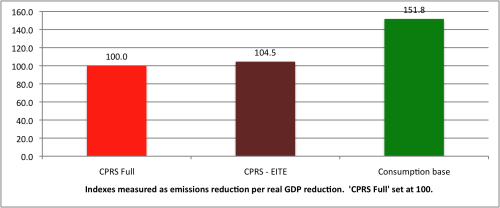Would a climate policy 50 per cent cheaper than the CPRS (Carbon Pollution Reduction Scheme) be worth a closer look?
An Access Economics report (Preliminary economic modelling of a national consumption-based approach to greenhouse gas emission abatement, August 24, 2009) compares the CPRS (targeting Australian greenhouse gas emissions production) with a policy targeting Australian emissions consumption. “Production” includes our emissions exports but not imports. “Consumption” includes our emissions imports but not exports.
Three options are compared:
Advertisement
- a no-concessions CPRS (labelled “CPRS full”);
- the Government’s CPRS including concessions for the “emissions intensive trade exposed” sector (labelled “CPRS-EITE”); and
- emissions consumption with no concessions (labelled “consumption base”).
The policies’ economy-wide effects are quantified using a global computable general equilibrium model, similar to those used by Treasury. It assumes Australia acts unilaterally, with no international trading of emission permits. The authors stress it’s a preliminary contribution to the debate, not an endorsement of the consumption approach.
The report shows reducing emissions by pricing them comes with economy-wide costs and reduced emissions benefits. The least-cost option is the target of “good policy”.
Modelling results can be summarised two ways. The first shows emissions reduction for a given cost (e.g., a reduction in GDP or job losses).
Chart 1 reports the findings expressed this way for 2020. For reducing Australian emissions production, the consumption-based policy is almost 52 per cent more efficient than the full CPRS, (and more than 45 per cent more efficient than the CPRS-EITE), assuming the same carbon price.
Chart 1. Cost-effectiveness emissions reduction indexes, CPRS and consumption bases, 2020
Advertisement

Source: Based on Access Economics’ preliminary modelling results for CEDA (derived from Report Table 4.1, page 14).
The second measure quantifies Australian cost penalties (e.g., extra losses of output and jobs) for a given emissions reduction under different policies (assuming the same carbon price).
Discuss in our Forums
See what other readers are saying about this article!
Click here to read & post comments.
6 posts so far.